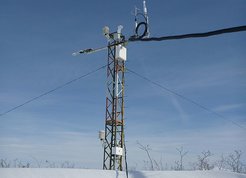Increasing CO2 release in arctic regions

Winter carbon measurements with an eddy covariance tower near Chersky (Photo: Martin Hertel)
Due to the harsh climatic conditions, only comparatively few measurement data from the northern permafrost regions exist during the polar winter.
For the first time, an international team recorded and evaluated more than a thousand balances of these CO2 emissions from more than 100 sites across the entire northern permafrost area. East of the Urals and north of the Arctic Circle, only two groups contributed to this study, including Mathias Göckede's group at the Max Planck Institute for Biogeochemistry in Jena, Germany.
"Of course, we knew before that carbon emissions from permafrost can still occur even at extremely low temperatures in winter, and that greenhouse gas processes therefore play an important role in the annual carbon balances during the cold season," says Göckede. "However, these new results indicate that the CO2 loss in winter already compensates for the carbon uptake of the entire previous vegetation period. Such high emissions were actually only expected in the context of a further future warming of the Arctic. And this loss is likely to increase with increasing warming of the climate."
The study published in Nature Climate Change used machine learning techniques and process models to assess current and future winter carbon losses from permafrost regions. As a result, the study warns that the loss of carbon dioxide from the world's major permafrost regions could increase by 41 percent in winter if man-made greenhouse gas emissions continue at their current pace.
Original publication:
Natali, S. M., Watts, J. D., Rogers, B. M., Potter, S., Ludwig, S. M., Selbmann, A.-K., Sullivan, P. F., Abbott, B. W., Arndt, K. A., Birch, L., Björkman, M. P., Bloom, A. A., Celis, G., Christensen, T. R., Christiansen, C. T., Commane, R., Cooper, E. J., Crill, P., Czimczik, C., Davydov, S., Du, J., Egan, J. E., Elberling, B., Euskirchen, E. S., Friborg, T., Genet, H., Göckede, M., Goodrich, J. P., Grogan, P., Helbig, M., Jafarov, E. E., Jastrow, J. D., Kalhori, A. A. M., Kim, Y., Kimball, J. S., Kutzbach, L., Lara, M. J., Larsen, K. S., Lee, B.-Y., Liu, Z., Loranty, M. M., Lund, M., Lupascu, M., Madani, N., Malhotra, A., Matamala, R., McFarland, J., McGuire, A. D., Michelsen, A., Minions, C., Oechel, W. C., Olefeldt, D., Parmentier, F.-J.-W., Pirk, N., Poulter, B., Quinton, W., Rezanezhad, F., Risk, D., Sachs, T., Schaefer, K., Schmidt, N. M., Schuur, E. A. G., Semenchuk, P. R., Shaver, G., Sonnentag, O., Starr, G., Treat, C. C., Waldrop, M. P., Wang, Y., Welker, J., Wille, C., Xu, X., Zhang, Z., Zhuang, Q., Zona, D. (2019).
Large loss of CO2 in winter observed across the northern permafrost region.
Nature Climate Change, 9, 852-857. 10.1038/s41558-019-0592-8
Contact:
Dr. Mathias Göckede
Max Planck Institute für Biogeochemistry
Hans-Knöll-Str. 10
07745 Jena, Germany
Mobile +49 151-5110 6657
mathias.goeckede@bgc-jena.mpg.de
